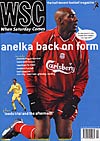 Dear WSC
Dear WSC
I attended the York v Colchester FA Cup second round replay. Ah, the magic of the FA Cup: went for a traditional pre-match pie and when the kiosk opened I was third in the queue. The first man ordered two meat pies. The second man ordered one meat pie. The response came back: “Sorry love, we’ve sold out.” I laughed so hard I lost my place in the queue. You don’t get that kind of comedy at Old Trafford.
Alex Gage, via email
The Archive
Articles from When Saturday Comes. All 27 years of WSC are in the process of being added. This may take a while.
 Contrary to the beliefs of the Phoenix League "reformers", Roger Titford argues that other European countries are moving towards the structure of our League
Contrary to the beliefs of the Phoenix League "reformers", Roger Titford argues that other European countries are moving towards the structure of our League
We dullards who are forever against wonderful innovations like the Phoenix League are often encouraged to look abroad and draw inspiration from the Continent. There, it is said, we will find more rational and streamlined ways to organise football leagues, which are not dragged back by the need to maintain an unwieldy four national divisions of professional clubs. The debate of late seems to be led by issues about dividing up TV money. The more fundamental question should be about league structures.
 In a brief spell at Middlesbrough, he won the hearts of the fans and the local TV celebrity, if you believe the gossip. Harry Pearson recalls a German cult hero
In a brief spell at Middlesbrough, he won the hearts of the fans and the local TV celebrity, if you believe the gossip. Harry Pearson recalls a German cult hero
No doubt there are many players whose careers illustrate Rupert Pupkin’s maxim “Better a star for a night than a schmuck for a lifetime”, but on Teesside none illuminates the point quite so brightly as a former Germany Under-21 international who was brought in from Kaiserslautern by Bryan Robson.
 Is women's football is due to make a big breakthrough on to the UK sport scene? Two writers have conflicting opinions
Is women's football is due to make a big breakthrough on to the UK sport scene? Two writers have conflicting opinions
Yes ~
“Football is all very well as a game for rough girls, but it is hardly suitable for delicate boys.” So said Oscar Wilde. If the women’s game continues to develop at the pace witnessed during the past decade, this observation could soon gain common currency.
 The blueprint for the European Cup was laid down in pre-war Budapest, Vienna and Prague. Cris Freddi recalls the mayhem and magnificence of the Mitropa
The blueprint for the European Cup was laid down in pre-war Budapest, Vienna and Prague. Cris Freddi recalls the mayhem and magnificence of the Mitropa
The name derives from Mittel Europa (central Europe) and the Cup was the baby of Hugo Meisl, international referee turned secretary of the Austrian FA and manager of the national team. After the Second World War, it couldn’t compete with first the Latin Cup, then UEFA’s three major club competitions and, although it staggered on in one form or another until 1992, ended up no better than an Intertoto.